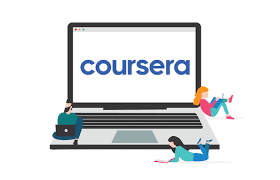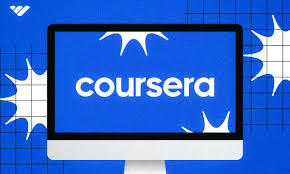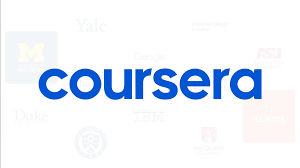Introduction: The New World of Education is Online
The traditional education model is undergoing a digital transformation, and Coursera stands at the forefront of this revolution. Founded in 2012 by Stanford professors Daphne Koller and Andrew Ng, Coursera has grown into one of the world’s largest online learning platforms. Today, over 130 million learners across 200 countries use Coursera to upskill, earn degrees, or simply explore new fields of knowledge from the comfort of their homes.
With partnerships from top universities like Stanford, Yale, and Imperial College London, and corporate collaborations with Google, IBM, Meta, and Amazon, Coursera brings world-class education to everyone—regardless of location, background, or budget.
This comprehensive blog dives into everything you need to know about Coursera in 2025: its evolution, course offerings, specializations, degrees, career credentials, pricing, and why it remains a powerhouse in the online learning ecosystem.

1. The Coursera Story: From Stanford to Global Stage
Coursera was launched in 2012 with a mission: “To provide universal access to the world’s best education.” Over a decade later, it has achieved that and more. Co-founded by AI pioneer Andrew Ng and computer scientist Daphne Koller, Coursera started by offering free Stanford courses and quickly expanded globally.
Today, Coursera partners with over 300 top institutions and boasts more than 10,000+ courses across all academic fields and industries.
2. How Coursera Works: A Platform for All Learners
Coursera offers a user-friendly experience for both beginners and advanced learners. The platform is organized into:
- Single Courses: Short, standalone classes
- Specializations: A series of related courses with a capstone project
- Professional Certificates: Career-aligned programs from tech giants
- MasterTrack™ Certificates: Portions of full degree programs
- Online Degrees: Bachelor’s and Master’s degrees fully online
Whether you’re learning Python or pursuing an MBA, Coursera gives you control over your education.
3. Types of Courses on Coursera
✅ Individual Courses
Perfect for learning specific skills or exploring a new interest. Most are 4–6 weeks long.
📚 Specializations
Focused learning paths made up of 3–6 courses. Topics include:
- Data Science Specialization by Johns Hopkins
- Business Foundations by Wharton
🎓 Professional Certificates
Job-ready training from:
- Google (IT Support, UX Design)
- Meta (Social Media Marketing)
- IBM (Data Science, Cybersecurity)
- Salesforce (CRM Admin)
🎓 Online Degrees
Earn accredited degrees online at a fraction of traditional costs.
4. Top Categories of Learning in 2025
Coursera has evolved to cover just about everything. Popular categories include:
- Technology & Programming: Python, AI, Cybersecurity, Full-Stack
- Business: Management, Finance, Entrepreneurship, Marketing
- Health & Medicine: Mental health, nutrition, public health
- Social Sciences: Psychology, Sociology, Political Science
- Languages: Spanish, Chinese, French, ESL
- Arts & Humanities: Music theory, writing, philosophy
In 2025, Coursera is pushing heavily into AI, green technology, remote work tools, and personal productivity.
5. Coursera Plus: Unlimited Access to Learning
Coursera Plus is the platform’s annual subscription plan, priced at $399/year (with occasional discounts).
Benefits:
- Unlimited access to 90%+ of courses
- Earn as many certificates as you want
- Cancel anytime
- Great ROI for professionals and lifelong learners

6. Professional Certificates for Career Growth
Professional certificates are the bridge between traditional education and the real-world job market. Coursera partners with companies like:
- Google: IT, Data Analytics, Project Management
- Meta: Front-End Development, Marketing Analytics
- IBM: Data Engineering, Cybersecurity
- Intuit: Bookkeeping
- Salesforce: Admin & Sales
They’re affordable, self-paced, and widely recognized by employers.
7. Full Online Degrees on Coursera
Yes, you can earn a real accredited degree through Coursera.
Top Degree Options:
- Bachelor of Science in Computer Science – University of London
- MBA – University of Illinois (iMBA)
- Master of Public Health – University of Michigan
- MCS in Data Science – University of Illinois
Costs range from $9,000 to $25,000, a fraction of on-campus programs.
8. Top University Partners
Coursera partners with prestigious universities such as:
- Stanford University
- Yale University
- University of Michigan
- Duke University
- University of London
- HEC Paris
- Indian School of Business
- Imperial College London
The platform now supports AI-generated subtitles, multilingual support, and even adaptive testing to enhance accessibility.
9. Corporate Training and Coursera for Business
Coursera for Business serves over 3,000 enterprises including:
- P&G
- L’Oréal
- Tata
- Infosys
- Danone
With dashboards for managers, skill tracking, and enterprise-grade LMS support, it’s become a favorite among learning & development (L&D) teams worldwide.
10. Learning for Free: Audit Options and Scholarships
Not ready to commit? You can audit most Coursera courses for free:
- No certification, but full access to content
- Pause/resume anytime
- Upgrade later if needed
Coursera also offers:
- Financial aid
- Special programs for refugees
- Student discounts

11. How Coursera Compares to Other Platforms
| Feature | Coursera | edX | Udemy | LinkedIn Learning |
|---|---|---|---|---|
| Free Courses | ✅ Yes | ✅ Yes | ✅ Yes | ❌ No |
| University Degrees | ✅ Yes | ✅ Yes | ❌ No | ❌ No |
| Certificates | ✅ Yes | ✅ Yes | ✅ Yes | ✅ Yes |
| Price Range | $0–$399+ | $0–$300+ | $10–$200 | $39.99/month |
| Career Support | ✅ Strong | ✅ Strong | ❌ Limited | ✅ Moderate |
Coursera is stronger in formal credentials and partnerships, while others like Udemy excel in casual learning.
12. User Interface, Mobile App, and Learning Experience
- Coursera App (Android & iOS): Download videos, quizzes, and readings for offline use
- Adaptive learning paths
- Progress tracking
- Quiz/exam feedback
- Subtitles and translations in 50+ languages
The platform is easy to navigate for all ages and tech skill levels.
13. SEO and Marketing Benefits for Educational Brands
Coursera’s SEO presence is unmatched:
- 10M+ monthly traffic
- Top-ranked in Google for 100K+ keywords
- High-quality backlinks from .edu and .gov domains
If you’re an institution or expert, publishing through Coursera boosts visibility, credibility, and revenue.
14. What Employers Think About Coursera Certificates
Coursera certificates are well-regarded in most tech, marketing, and business fields.
Employers like:
- Amazon
- Deloitte
- EY
- IBM
- Accenture
acknowledge the value of Coursera credentials, especially from branded partners.
15. Real User Reviews and Success Stories
“Thanks to Coursera, I went from being a warehouse worker to a Google-certified IT technician in 9 months.” – James, UK
“The University of Michigan’s writing course helped me land a content strategist job.” – Priya, India
“Coursera’s MBA program saved me $40,000 while letting me study around my full-time job.” – Marcus, USA
16. What’s New in Coursera 2025?
- AI-powered course suggestions
- Live Q&A sessions with instructors
- Skill-based learning paths
- Integration with ChatGPT for instant tutoring
- Virtual labs for coding, marketing, and simulations
- Blockchain-based certificates
Coursera in 2025 is more interactive, flexible, and job-focused than ever before.
17. Conclusion: Is Coursera Worth It in 2025?
In a world where digital skills are currency and lifelong learning is the norm, Coursera is more than worth it—it’s essential.
Whether you’re:
- A student exploring career options
- A professional looking to upskill
- A company training its workforce
- Or a lifelong learner hungry for growth
Coursera offers flexible, affordable, and impactful education. In 2025 and beyond, Coursera remains one of the best investments in yourself.
